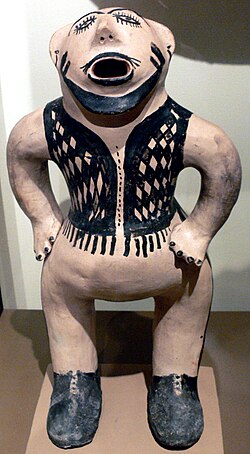Cochiti, New Mexico
| Cochiti, New Mexico | ||
|---|---|---|
| CDP | ||

Cochiti Pueblo clay figure (mono), circa 1883
|
||
|
||
 Location of Cochiti, New Mexico |
||
| Country | United States | |
| State | New Mexico | |
| County | Sandoval | |
| Area | ||
| • Total | 1.2 sq mi (3.1 km2) | |
| • Land | 1.2 sq mi (3.1 km2) | |
| • Water | 0.0 sq mi (0.0 km2) | |
| Elevation | 5,276 ft (1,608 m) | |
| Population (2010) | ||
| • Total | 528 | |
| • Density | 440/sq mi (170/km2) | |
| Time zone | Mountain (MST) (UTC-7) | |
| • Summer (DST) | MDT (UTC-6) | |
| Area code(s) | 505 | |
| FIPS code | 35-16560 | |
| GNIS feature ID | 1867383 | |
| Website | http://www.pueblodecochiti.org/ | |
|
Cochiti Pueblo
|
||

Cochiti Pueblo between c. 1871-c. 1907
|
||
| Nearest city | Cochiti, New Mexico | |
| Coordinates | 35°36′32″N 106°20′41″W / 35.60889°N 106.34472°W | |
| Area | 61 acres (25 ha) | |
| Built | 1250 | |
| Architect | Fr. Juan de Rozas | |
| Architectural style | Pueblo | |
| NRHP Reference # | 74001205 | |
| NMSRCP # | 234 | |
| Significant dates | ||
| Added to NRHP | November 20, 1974 | |
| Designated NMSRCP | February 1, 1972 | |
Cochiti (/ˈkoʊtʃəti/; Eastern Keresan: Kotyit) is a census-designated place (CDP) in Sandoval County, New Mexico, United States. A historic pueblo of the Cochiti people, it is part of the Albuquerque Metropolitan Statistical Area. The population was 528 at the 2010 census.
Located 22 miles (35 km) southwest of Santa Fe, the community is listed as a historic district on the National Register of Historic Places. The Cochiti pueblo people are a federally recognized tribe of Native Americans.
Potters of Cochiti and Tewa (formerly Santo Domingo) have made traditional pots for centuries, developing styles for different purposes and expressing deep beliefs in their designs. Since the early decades of the 20th century, these pots have been appreciated by a wider audience outside the pueblos. Continuing to use traditional techniques, in the late 20th and early 21st centuries, potters have also expanded their designs and repertoire in pottery, which has an international market.
The Cochiti speak Keres, an eastern Keresan language, which is a language isolate. In the early 21st century, the Keres Children's Learning Center, an independent Keres immersion school, was founded to aid with preservation of their language and culture. It has added grades since its founding.
...
Wikipedia



